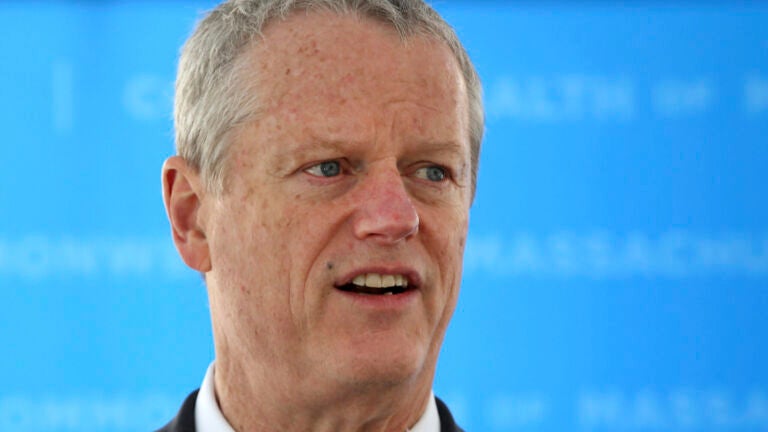"There is no evidence that we need to incentivize purchasing. Consumer demand is high."

Shoppers in Massachusetts typically save a few bucks for two days every August when, under state law, the commonwealth’s two-day tax holiday rolls around.
But Gov. Charlie Baker is apparently looking to drum up something bigger this year.
On Wednesday, Baker filed legislation to make August and September tax free holidays, hoping to give small businesses a financial boon following the damage brought on by the COVID-19 pandemic.
“A two-month sales tax holiday will provide a boost to Massachusetts’ taxpayers and Main Street economies as we continue to recover from COVID-19,” Baker said in a statement. “Massachusetts’ economic recovery is off to a good start, but it’s crucial that the Commonwealth takes action now to spur more economic activity in communities and support taxpayers.”
The Baker Administration says the state is in good standing to pass up on some tax revenue for the two-month span.
Tax revenues for the current fiscal year have exceeded projections, with a 14.9 percent or $3.938 billion increase over the year-to-date benchmark, officials say.
On Tuesday, the state Department of Revenue certified that $2.3 billion in capital gains tax revenue has been raised so far in the 2021 fiscal year, with $852 million going toward the state’s stabilization fund. Otherwise known as the “Rainy Day Fund,” the account has a balance of $4.4 billion — higher now than before the health crisis, according to Baker.
Altogether, along with $5.3 billion in federal relief funding, the Bay State is set to end the fiscal year with a “significant surplus” to the budget, Baker Administration officials say.
“We recognize that many residents, families, and small businesses continue to face challenges related to the COVID-19 pandemic,” Lt. Gov. Karyn Polito said in a statement. “As a result of the Commonwealth’s strong revenue performance, we are proposing to extend the annual sales tax-free weekend to two months to help support small and local businesses throughout Massachusetts and power our economy forward.”
Under a state law signed by Baker in 2018, lawmakers must designate a sales tax holiday each year — a practice the state had often followed in previous years but that was not previously permanent.
During the holiday, shoppers are not charged the state’s 6.25 percent sales tax for many purchases, including those made online, although there are limitations. Any single item over $2,5000, for instance, is still subject to the tax, but a transaction of that amount made up of several items is not.
And not all purchases are eligible. Meals, motor vehicles, motorboats, telecommunications services, gas, steam, electricity, tobacco products, marijuana products, and alcoholic beverages still face sales tax.
John Hurst, president of the Retailers of Massachusetts Association, sees Baker’s move as an incentive that will help aid both consumers and mom-and-pop shops at the right time.
“Consumers represent 70 percent of our economy, and it is important that we encourage them to invest in our Main Streets, small businesses, and communities,” Hurst said in a statement. “And for our lower income families, this tax cut is all about temporarily suspending the most regressive tax on the books, just as their children are heading back to school.”
But tax experts have said the holidays are more of a political gimmick than effective policy.
On Wednesday, several Democratic Massachusetts lawmakers derided the Republican governor’s bill through highlighting numerous issues and initiatives that would benefit from tax revenue that would be lost should the legislation take hold.
“There is no evidence that we need to incentivize purchasing,” state Rep. Mindy Domb, an Amherst Democrat, wrote on Twitter. “Consumer demand is high. Instead of an extended sales tax holiday, let’s put funds towards our future: relieve student debt, support public higher education, address rent relief post-pandemic. I could make a long list.”
Democratic State Rep. Tommy Vitolo, of Brookline, offered that officials could instead invest in education, housing, and transit, or even make public bond payments.
“C’mon man,” he tweeted.
Regardless, state law requires lawmakers to settle on the tax holiday dates each year.
Last week, House and Senate lawmakers settled on Aug. 14 and 15. The Baker Administration declared Wednesday the two dates will serve as this year’s tax holiday should his pending legislation not take hold.
Newsletter Signup
Stay up to date on all the latest news from Boston.com
June 24, 2021 at 03:57AM
https://ift.tt/3d7IZjS
Charlie Baker wants to make August and September sales tax free. Some say it’s not the best idea. - Boston.com
https://ift.tt/2QoXNjh
Holiday

No comments:
Post a Comment